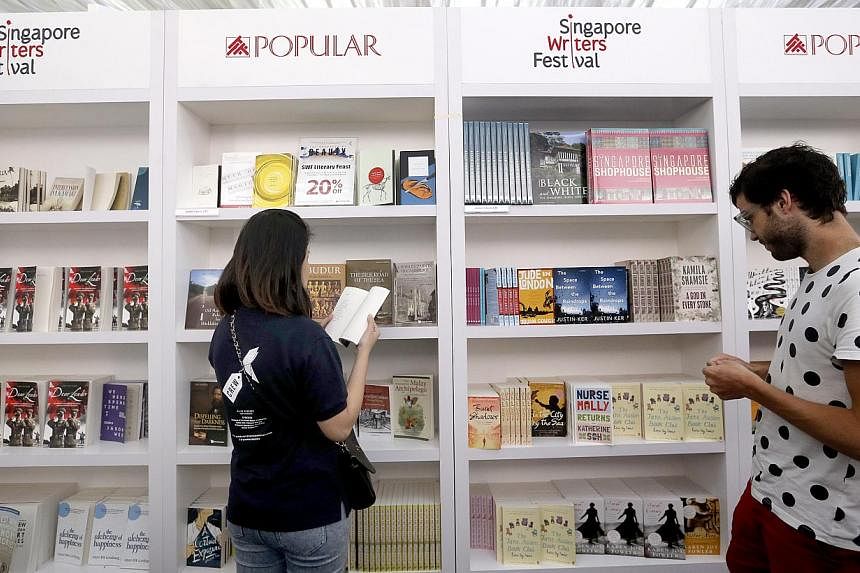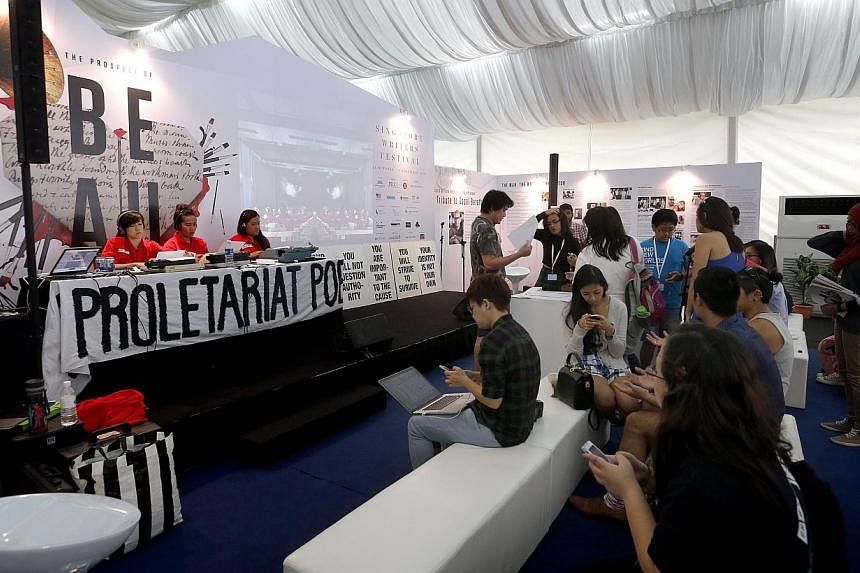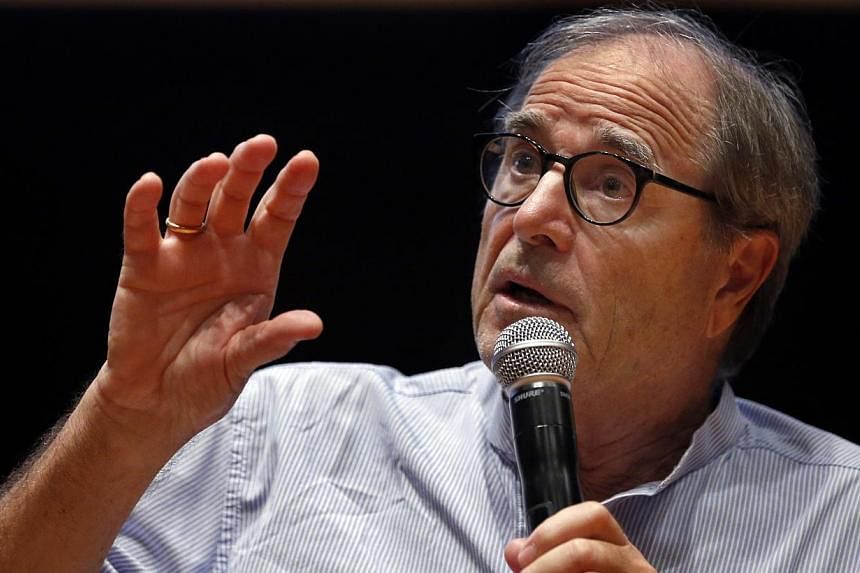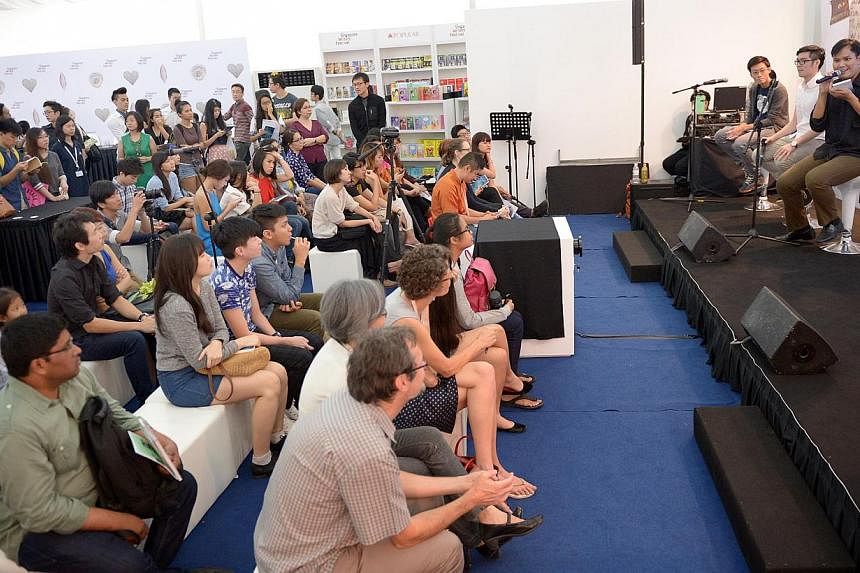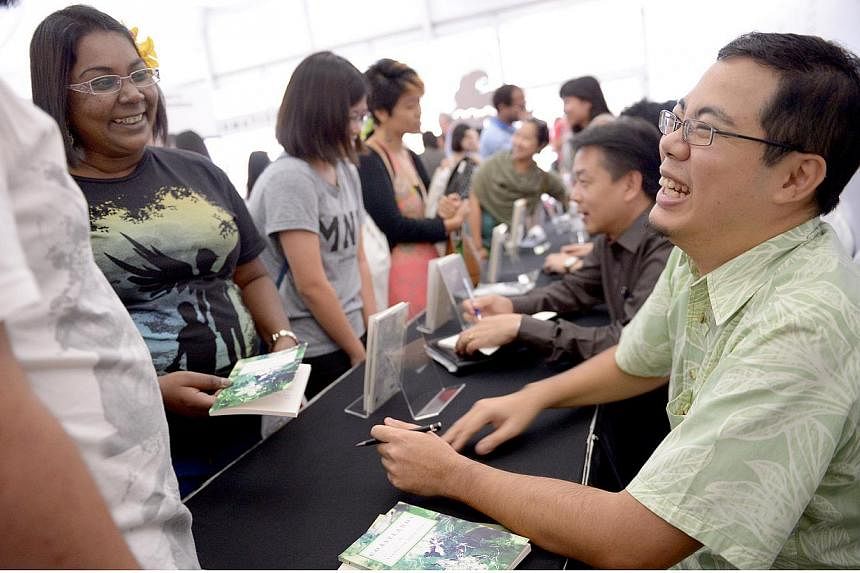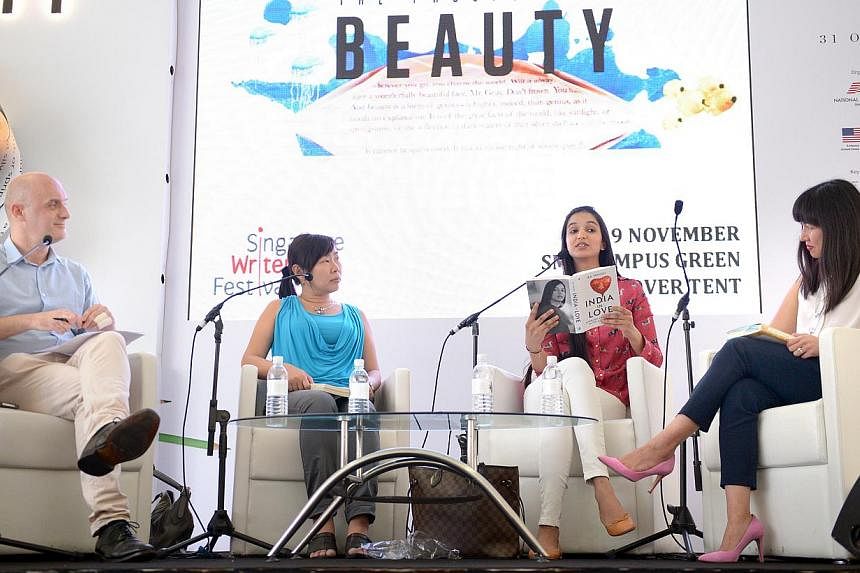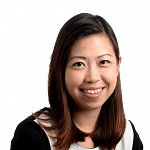Poet and outgoing director of the Singapore Writers Festival, Paul Tan, ended his four-year tenure on a high after the festival's light-hearted closing debate on Sunday.
The 10-day festival, which featured more than 280 events and was a substantially larger programme than last year's, closed with writers like The Teenage Textbook's Adrian Tan and poet and literary critic Gwee Li Sui irreverently dissecting whether True Art Is Always Ugly to an overflowing house at the festival's main tent on Singapore Management University's Campus Green.
Earlier on, the likes of iconic travel writer Paul Theroux, Man Booker Prize-shortlisted novelist Karen Joy Fowler and Pulitzer Prize-winning poet Paul Muldoon had headlined panels alongside Singapore literati such as Catherine Lim, Cyril Wong and Isa Kamari. This year's festival, which carried the theme The Prospect Of Beauty, featured a total of 138 Singapore writers and a 69-strong international contingent, compared with last year's 200 events featuring 200 authors.
About 3,200 festival passes were taken up this year, more than the 3,000 last year. This was despite a $5 hike in the price of the passes to $20 apiece.
Well-known Singapore poet Alvin Pang, 42, felt "this year's edition is in some ways Paul's best ever", calling the line-up "fabulous", with a "strong and wellreceived poetry programme".
Award-winning Singapore writer Dave Chua, 43, echoed these sentiments: "I think he's done a great job in creating a festival that can appeal to a wider audience. There's something for everyone. Folks who said they never attended previous festivals have come for the festivals that Paul has directed."
Next year, Tan, 43, will pass the baton to poet and former Straits Times journalist Yeow Kai Chai, and the festival will be returning to The Arts House, which co-hosted the 2007 and 2009 editions of the festival when it was a biennial event.
Tan was recently appointed deputy chief executive of the National Arts Council, which organises the festival. He was delighted at this year's turnout, as well as the deep exchanges and revelatory remarks that had emerged from writers discussing art and life: "That 'click' moment, that tiny epiphany, the light bulbs going off in your head - that's the kind of stuff that the festival has done some of and I hope it continues to do that."
Tan took pains to emphasise that the festival was "a team effort" with six full-time staff - "there's no way one person can oversee everything".
The festival lectures and workshops with featured authors saw healthy attendances, a total of 1,482, up from about 1,300 last year. Many ticketed programmes were sold out prior to the festival, such as the experiential murder-mystery play Body X, co-directed by theatre practitioners Li Xie and Danny Yeo, which took place at The Arts House, and literary tours of the city with Singapore writers such as Verena Tay, Colin Cheong and Desmond Kon.
The more popular programmes, such as Theroux's lecture and Meet The Author session and The Art Of Satire panel featuring writer Alfian Sa'at, blogger Benjamin "Mr Miyagi" Lee and humour columnist Neil Humphreys, were packed to the rafters with standing room only. During several autograph sessions at the festival pavilion, lines snaked out of the tents as eager readers waited for a glimpse of their idols.
But earlier this year, all was not as rosy.
The National Library Board's decision to remove and pulp three children's books with references to homosexuality and alternative family units from its shelves in July sparked a deluge of boycotts and fierce criticism from writers. For a moment, the festival seemed to be caught in the controversy's rough wake - the board is one of its venue and programme partners, and prominent playwright and novelist Ovidia Yu resigned from the festival's steering committee during the saga. It ended with the board putting two of the books back up, albeit in the adults section.
The festival team did its best to steer through rough waters by tackling issues connected to censorship. It programmed panels such as Dangerous Spines, where publisher Fong Hoe Fang, American activist Naomi Wolf and Humphreys discussed how modern society deals with books that challenge or offend sensibilities; and The State of Literature, where the state's role in the making and reading of literature was discussed by genre-bending American author Jonathan Lethem, award-winning Singapore writer Yeng Pway Ngon and Man Asian Literary Prize winner Miguel Syjuco from the Philippines.
Tan says: "A good literary festival must engage with the ideas of the day. By talking about how an American author deals with 'dangerous' content, like Wolf, or how Syjuco saw the role of the state in literature, I think it allows us to see how other people do it and it allows us to see what we did.
"The ability to have a mature discussion, and for people to recognise that there are different views and respect those views - if the festival can do that, I think it is a part of what a mature society should be."
This lively spirit of debate and discussion was present in many panels, with erudite panellists and moderators alike coming together to dissect everything from Singapore's methods of governance to morality in writing. There were also thoughtful, pointed questions from audience members.
Not all panels were equally well-managed, however, with some moderators struggling to go beyond surface-level questions or being steamrolled by audience members or panellists who went on and on.
But overall, the drive to engage was deeply present. For instance, issues of gender, privilege and feminism were hotly debated. It happened during Wolf's lively lecture, which later saw her squaring off against moderator Dana Lam from the Association of Women for Action and Research on whether the organisation would consider including men as full members. There was also a kerfuffle over alleged gender bias in the wake of the Singapore Literature Prize results. Two male poets, Joshua Ip and Yong Shu Hoong, were selected as joint winners in the poetry category, prompting criticisms from poet Grace Chia, who was also on the shortlist.
However, writer and translator Jeremy Tiang, 37, felt the festival could have dealt more explicitly with what is now termed Penguin Gate - one of the books taken off the shelves and later restored in the adults section was a tale of two male penguins adopting a baby penguin. He said: "Nothing else has galvanised the literary community as much this year, and it would have been nice if a space had been created to further examine this."
But he was pleased at "how foregrounded translation was in this festival and the extent to which translators and the craft of translation were featured". He added: "I think this is the way forward in multilingual Singapore and an increasingly globalised world and I hope that this trend will continue."
The festival prides itself on being a multilingual one, but Tan acknowledges that they still have more to do in refining this area of focus and "building bridges" between different languages.
All the same, his tenure brought out a deeper multidisciplinary focus.
This year's edition saw poetry mixed with music, as was the case for former United States Poet Laureate Robert Pinsky's PoemJazz performance with jazz musicians as well as Apart, a blend of poetic and theatrical forms featuring Singaporean poets and playwright Joel Tan.
Audience member Charlene Shepherdson, 30, a learning designer who helps with lesson planning and also organises poetry open mic nights, said of this: "As much as we try to push for multidisciplinary art sometimes, I think everyone stays in their own little categories, so I'm really glad they're trying new things at the festival this year."
The festival's focus on Singapore writers, who effortlessly matched or even exceeded the crowds drawn by many international writers, is also something Tan is particularly proud of.
He says: "I think the festival has played a part in shining a clear spotlight on Singapore writing. I think most Singapore writers feel that this festival has new readers coming in. It celebrates their writing, it celebrates their craft, it gives them a certain pride of place."
The literary community is already looking forward to the next edition.
Poet Pang says: "I trust Kai Chai... will bring a fresh edginess to the line-up, challenge some aesthetic habits and give us a sense of what's fresh and new out there - the current programming, while excellent, still leans towards the mainstream. Nothing wrong with that, as it has brought in a diverse and healthy audience, which surely is Paul's legacy."
Follow Corrie Tan on Twitter @CorrieTan
